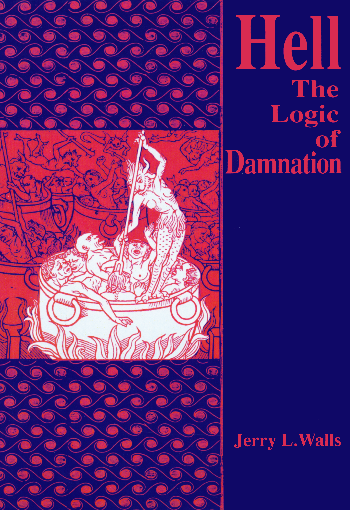Jerry Walls: Hell: The Logic of Damnation
 Jerry L. Walls, Hell: The Logic of Damnation (University of Notre Dame Press, 1992), 182 pages, ISBN 9780268010966.
Jerry L. Walls, Hell: The Logic of Damnation (University of Notre Dame Press, 1992), 182 pages, ISBN 9780268010966.
Jerry Walls is not the first to observe that the doctrine of hell seems to have slipped from contemporary Christian consciousness. Among theologians, the slide towards annihilationism or universalism (in one form or another) has not been confined to the liberals1. And in the culture at large, ‘genuine concern about hell seems to be lost in our past, along with powdered wigs and witch trials’.
A detailed account of how this has happened is beyond the scope of Walls’ study. But the question of why belief in eternal punishment has been increasingly abandoned among the more orthodox has a fairly simple answer: the doctrine of hell is ‘widely regarded to be morally indefensible’. In fact, the famous philosopher Bertrand Russell had no qualms about finding fault with Jesus Christ Himself on this point, since nobody, Russell argued, “who is profoundly humane can believe in everlasting punishment”. For James Mill, a God who sent people to hell represented ‘the most perfect conception of wickedness’.
In the face of high-powered criticism, and with its negative impact upon an already difficult ‘problem of evil’, it is not surprising that many have been tempted to drop belief in eternal hell as a stumbling block that is inconsistent with a Christian conception of a loving God, and an intellectual encumbrance on the gospel.
Nevertheless, for many conservatives, the attractive reinterpretations of biblical teaching proffered by theologians rejecting this aspect of the Faith, whilst not without merit, are not entirely convincing. Walls for one believes that, on reflection, the doctrine of hell turns out to be more intimately interwoven with the heart of traditional Christian belief than may at first appear. If this is the case, he argues, then Christians face an unpleasant dilemma: if belief in hell is a basic part of Christianity, and if it is a moral defect to believe in hell, then one cannot be a Christian without being morally defective. In this book, Walls’ argues that the doctrine of eternal hell can be construed in ways that are neither immoral nor unintelligible. In what follows, I shall attempt to offer a brief synopsis of his argument.
1. Hell and Human Belief
Interestingly, as Walls relates, the actual phenomenon of belief in eternal hell has been used against the doctrine – and on both flanks. On the one side, it has been argued that Christians themselves do not really believe in it. And on the other, it has been observed that some Christians seem altogether too willing to believe in it! No one, of course, is claiming that hell’s existence is actually contingent upon the intentional state of people’s minds. The arguments from belief (or non-belief) are epistemological.
Some Christians have suggested that, when we honestly look into our hearts, we discover a universalist hope that cannot bear to think of anybody being lost, and that this presents us with a prima facie reason for thinking the traditional doctrine of hell to be untrue. People may accept the doctrine, but in their hearts they find they do not believe it, and the Christian heart is purportedly ‘shaped [in some measure] by the Spirit of God’. Further evidence that they do not believe it is that they do not act like it: we would immediately warn our unbelieving neighbour if his house was on fire, but we seem ‘strangely reconciled’ to his eternal fate. Walls takes these objections seriously, but ultimately rejects them. The burning house analogy, for instance, is flawed. ‘In the first place, if [our neighbour’s] house was on fire, he would certainly want to know about it. And second, he would surely consider it a real danger … However, these assumptions do not necessarily hold with respect to hell’. Nor can the seriousness of someone’s damnation be ‘instilled in a moment’. More troubling, however, is the thought that this sort of argument, if it went through, would place a good deal of Christian belief in question, besides the doctrine of hell. That few ‘seem to be appropriately moved… in the normal course of their daily routines’ by the extraordinary content of Christian teaching is interesting, and something we should reflect on, but not something we should accept as warrant for questioning the veracity of Christian doctrine. And there are shining counterexamples in the life and ministry of such saints as John Wesley. Regarding the evidence of Christian feelings, which ‘relies mainly on the testimony of contemporary Christians’, Walls contends that ‘the witness of the Christian heart is divided’. The same emotions may attend the state of ‘regretting the doctrine of eternal hell’ as well as the state of ‘hoping that is not true’, and Walls believes that many Christians fall in the former category. Moreover, ‘the compatibility of hoping for something while believing it is not very likely to happen blocks any direct argument from the existence of a widespread Christian hope that none will finally be lost to the conclusion that Christians “deep down” do not really believe in eternal hell’.


